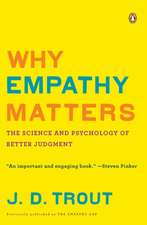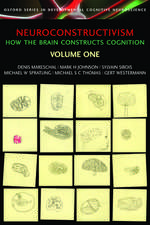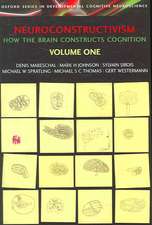Neurophenomenology and Its Applications to Psychology
Editat de Susan Gordonen Limba Engleză Hardback – 11 iun 2013
| Toate formatele și edițiile | Preț | Express |
|---|---|---|
| Paperback (1) | 637.13 lei 6-8 săpt. | |
| Springer – 8 feb 2015 | 637.13 lei 6-8 săpt. | |
| Hardback (1) | 643.34 lei 6-8 săpt. | |
| Springer – 11 iun 2013 | 643.34 lei 6-8 săpt. |
Preț: 643.34 lei
Preț vechi: 756.86 lei
-15% Nou
Puncte Express: 965
Preț estimativ în valută:
123.14€ • 133.80$ • 103.51£
123.14€ • 133.80$ • 103.51£
Carte tipărită la comandă
Livrare economică 21 aprilie-05 mai
Preluare comenzi: 021 569.72.76
Specificații
ISBN-13: 9781461472384
ISBN-10: 1461472385
Pagini: 228
Ilustrații: XXXVI, 191 p. 2 illus.
Dimensiuni: 155 x 235 x 18 mm
Greutate: 0.5 kg
Ediția:2013
Editura: Springer
Colecția Springer
Locul publicării:New York, NY, United States
ISBN-10: 1461472385
Pagini: 228
Ilustrații: XXXVI, 191 p. 2 illus.
Dimensiuni: 155 x 235 x 18 mm
Greutate: 0.5 kg
Ediția:2013
Editura: Springer
Colecția Springer
Locul publicării:New York, NY, United States
Public țintă
ResearchCuprins
Enactive Cognition and the Neurophenomenology of Emotion.- Neurophenomenological Praxis: Its Applications to Leaning and Pedagogy.- Cognitive Phenomenology in the Study of Tibetan Meditation: Phenomenological Descriptions vs. Meditation Styles.- Déjà Vu: William James on "The Brain and the Mind,"1878.- Psychoneurointracrinology: The Embodied Self.
Recenzii
“Susan Gordon has produced a timely book with her new volume on Neurophenomenology. Neurophenomenology is a hot topic within philosophy and neuroscience, yet its assimilation within mainstream psychology is lagging. This book attempts to bridge the gap between philosophical neurophenomenology and such psychological domains as cognition, emotion, learning, pedagogy, meditation, and psychoneuroimmunology. The book also establishes the kinship of neurophenomenology with humanistic psychology, William James’ radical empiricism, and transpersonal psychology.” (Don Moss, Ph.D., Dean, College of Integrative Medicine and Health Sciences, Chair, School, of Mind-Body Medicine, Saybrook University, Oakland, CA, The Humanistic Psychologist, 43(1))
Notă biografică
Susan Gordon, Ph.D., Core Adjunct Professor, Department of Psychology, National University, La Jolla, CA Research Director, Southbury Clinic for Traditional Medicines, Southbury, CT, invited Postdoctoral Fellowships: L'Institut des Systèmes Complexes Paris Île-de-France (ISC-PIF); Centrede Recherche en Epistémologie Appliquée (CREA) (École Polytechnique), Research Affiliate, Harvard College Library and Bibliothèque François Mitterrand.
Textul de pe ultima copertă
Praise for Neurophenomenology and Its Applications to Psychology:
“Forward edge of contemporary efforts to integrate natural and human science approaches to consciousness. All chapters are evenly and clearly written.”
Constance T. Fischer, Ph.D., ABPP, Duquesne University, Pittsburgh, PA
“A much welcome, if not over-due, translation of neurophenomenological principles—which have previously remained limited to philosophical discourse—to some of the central concerns of psychologists.”
Larry Davidson, Ph.D., Yale University, New Haven, CT
“A heady mix of articles that elucidates the ‘hard problem’ of mind/brain interrelations and travels some distance in closing the circle of psychology on neuroscience.”
Edward Mendelowitz, Ph.D., Saybrook University, San Francisco, CA
“This volume accomplishes the elegant and timely synthesis of phenomenology, transpersonal and humanistic-somatic psychologies as they applyto contemporary neuroscience. Beginners and advanced scholars will benefit greatly.”
Aaron L. Mishara, Ph.D., Psy.D., Sofia University, Palo Alto, CA
The nature of consciousness and the self, the mind's role in informing the brain, the experience of personal growth: all are ideas mainly associated with philosophy rather than hard science. In response, Neurophenomenology and Its Applications to Psychology translates integrative concepts in neurophenomenology into terms that are clearest and most useful to students and practitioners across psychological disciplines. Removing conceptual barriers that have traditionally kept cognitive and emotional phenomena relegated to separate areas of the brain, these groundbreaking models present existential-phenomenological and humanistic-transpersonal perspectives in neuroscience context for real-world usefulness. The book demonstrates the potential of the field to transform psychology at both experimental and practical levels as it:
“Forward edge of contemporary efforts to integrate natural and human science approaches to consciousness. All chapters are evenly and clearly written.”
Constance T. Fischer, Ph.D., ABPP, Duquesne University, Pittsburgh, PA
“A much welcome, if not over-due, translation of neurophenomenological principles—which have previously remained limited to philosophical discourse—to some of the central concerns of psychologists.”
Larry Davidson, Ph.D., Yale University, New Haven, CT
“A heady mix of articles that elucidates the ‘hard problem’ of mind/brain interrelations and travels some distance in closing the circle of psychology on neuroscience.”
Edward Mendelowitz, Ph.D., Saybrook University, San Francisco, CA
“This volume accomplishes the elegant and timely synthesis of phenomenology, transpersonal and humanistic-somatic psychologies as they applyto contemporary neuroscience. Beginners and advanced scholars will benefit greatly.”
Aaron L. Mishara, Ph.D., Psy.D., Sofia University, Palo Alto, CA
The nature of consciousness and the self, the mind's role in informing the brain, the experience of personal growth: all are ideas mainly associated with philosophy rather than hard science. In response, Neurophenomenology and Its Applications to Psychology translates integrative concepts in neurophenomenology into terms that are clearest and most useful to students and practitioners across psychological disciplines. Removing conceptual barriers that have traditionally kept cognitive and emotional phenomena relegated to separate areas of the brain, these groundbreaking models present existential-phenomenological and humanistic-transpersonal perspectives in neuroscience context for real-world usefulness. The book demonstrates the potential of the field to transform psychology at both experimental and practical levels as it:
- Synthesizes neurobiological, cognitive, and experiential approaches into a neurophenomenology of emotion.
- Applies neurophenomenology to the processes of thinking and learning.
- Analyzes cognitive changes during meditation and their implications for psychology.
- Revisits William James' "The Brain and the Mind."
- Introduces the embodied self, a psychoneurointracrinological link between mind/brain.
Caracteristici
Explores the meaning and import of neurophenomenology Introduces the psychologist to a theoretical and practical framework Integrates the approaches of natural and human science to consciousness Emphasizes a non-reductionistic, holistic approach Includes supplementary material: sn.pub/extras















